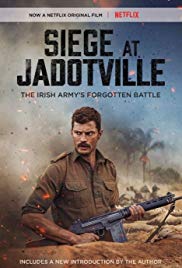
THE SIEGE OF JADOTVILLE
Ireland/South Africa, 2016, 108 minutes, Colour.
Jamie Dornan, Mark Strong, Danny Sapani, Guillaume Canet, Michael Mc Elhatton, Fionn O' Shea, Sam Keely, Ronan Raftery, Jason O' Mara,
Directed by Richie Smyth.
This film is a very interesting invitation to go back into African history in the middle of the 20th century. It was well acclaimed and won a number of Irish film and television awards.
The film provides the political background of the Congo and the assassination of Patrice Lumumba. It also highlights the political activity of Moise Tshombe (Daniel Lapani) and his secession, and the exploitation of the uranium mines. This is of concern to the United Nations, especially General Secretary, Dag Ham, who enlists the help of diplomat, Conor Cruise O’Brien? (Mark Strong) with a warning that the situation has the potential for World War 3.
In the meantime, we are introduced to Irish troops, led by Pat Quinlan (Jamie Dornan), their training in Ireland, the farewells from family, their being posted to the Congo, the initial clashes with the rebels, the work by Indian UN peacekeepers.
Much of the film shows the Irish and their mission, Quinlan and his leadership, digging trenches around the military establishment. Quinlan also meets a French mercenary (Guillaume Canet), enlisted to protect the interest of the rebels and the mines.
Ultimately, there is an attack, the Irish digging in, repelling waves of attack, a state of siege, but, ultimately, their having to surrender. At first, their reputation is at stake because of the surrender but, in later decades, their work was acknowledged.
1. A narrative based on actual events? The independence movements in Africa? In Congo, civil wars and secession? The United Nations, peacekeeping troops, the Irish presence? Dag Hammarskjold and the United Nations? Conor Cruise O’ Brien and his mission? Audience knowledge of the events – and the final information that it was considered a surrender and damaging the image of the United Nations, the treatment of the soldiers? Then vindication in 2005?
2. The Irish settings, peacekeeping forces, training, not experienced in battle? Family relationships and the farewell?
3. The African locations, filmed in South Africa, the beauty of the countryside, sky, sunsets…? The fort and its being exposed? The town, airport, lavish colonial buildings, the authorities?
4. The opening, the killing of Patrice Lumumba? Moses Tshombe, the killing, his assuming power, his living Western luxury, his wanting power, secession, the uranium mines, the contact with de Gaulle, getting the legionaries and mercenaries as security guards? His manipulation of politics, international politics, the United Nations? The final information about his loss of power and his death?
5. The introduction to the Irishmen? Pat and his reputation? Intelligent, shrewd, quick thinking? The background of his family, his wife, the phone calls to her? His relationship with the men? The young men, called up, their pride in their work, the initial parade, the review? Their age, inexperience? The reaction to the African countryside?
6. The background of politics, the United Nations and the secretary general, his interventions, policies, with Connor Cruise O’ Brien, his mission? Meetings, discussions, his coming to Africa, the crash and his death? John F. Kennedy’s tribute? Conor Cruise O’ Brien, politician, theoretician? His briefings, his discussions, with the general? Being sent to Africa, seeing him in action, his decisions, policies, reasonings, his secretary, with the general, abandoning the Irish? The repercussions of the killing by the local militia?
7. The Irish, settling in, exposed, the digging of the trenches? Supplies, going into town, meeting the French leader, playing mind games, sharing the drink? The threats?
8. The suddenness of the attack, the African troops and French, their skills, weapons and power? The visualising of the attack? The courage of the Irish, the sniper, Pat and his decisions? Able to effect maximum damage on the attackers, the retreating?
9. Pat and the discussions with the authorities, the general, the promises of reinforcements, the small group and their being turned back at the bridge? The general and his reluctance? Orders?
10. The continued attacks, the growing numbers in the attack, destroying weaponry, the shooting of the man in white? Retreats?
11. The mass attack, the vast numbers, exploding the bullet cases? The ceasefire? Pat and his going out to meet the French commander? Shaking hands? Traps?
12. The men, being wounded, continuing on, Pat being shot? The discussion about what they should do? The surrender? The imprisonment for the month? Their expectations of commendation? The return, Pat punching the general? O’ Brien watching? The men back, the long and continued salute to Pat? His being reunited with his wife?
13. The film as a war film, the attention to detail, the strategies, the manoeuvres, immersing the audience with the Irish? Audience response to the aftermath, the lack of recognition of the Irish until 2005? The film dedicated to these men?